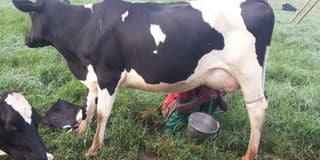Namutumba farmers seek govt help to process dairy products

Using milking machines instead of manual means saves costs on labour. Photo by Fred Muzaale.
What you need to know:
- To process milk products and push the milk value chain, Mr Igaga says, Namutumba District must have a functional milk cooler machine and milk collection centre llike the one in Katakwi, Kyegegwa and Nakasongola districts.
Over 500 dairy farmers in Namutumba District are finding it difficult to process and add value to their milk due to lack of a modern milk collection centre and functional milk cooler machine.
Under their organisation, Namutumba Dairy Farmers’ Cooperative Savings and Credit Society, the farmers also say that despite producing over 4,000 litres of milk daily, they lack (milk) cans to assist them in marketing and grading.
Subsequently, they are using jerry cans to ferry milk which are not recommended by the Dairy Development Authority (DDA).
The DDA is a semi-autonomous agency under the Ministry of Agriculture, Animal Industries and Fisheries, mandated to develop and regulate the dairy industry in the country.
“Recently, the government procured a total of 1,493 milk cans, which were distributed to dairy farmers across the country, but those in Namutumba were not considered,” Mr Juma Igaga, the association’s secretary said at the weekend.
According to Mr Igaga, farmers who are engaged in dairy as business are not promoting milk products, which has affected milk production, handling and promotion of value addition.
“Our efforts to address post-harvest losses and promote production in the dairy industry have failed because we lack training on how to make milk products like yoghurt among other products, to sell and make it competitive on the world market,” Mr Igaga further explained.
To process milk products and push the milk value chain, Mr Igaga says, Namutumba District must have a functional milk cooler machine and milk collection centre llike the one in Katakwi, Kyegegwa and Nakasongola districts.
During the 2008/2009 Financial Year, the government, under the Community Agricultural Infrastructure Improvement Programme (CAIIP) project, constructed a milk cooler machine in Nakyere village, Namutumba sub-county, which, unfortunately, remains nonfunctional to-date.
Ms Sheila Atuhaire, an official from the DDA, however, says whereas dairy farmers in Namutumba District lack a milk collection centre and functional milk cooler machine, that should not stop them from continuing with the dairy business.
“The quality of milk and milk products is not rising on the world market because most famers add water to the milk which spoils its quality, while others sell boiled milk,” she said.
She added: “The government, through the DDA, has come up with penalties which will see farmers found adding water to milk fined or imprisoned.”
The chairperson of dairy farmers in Namutumba, Mr Joseph Baganda, says milk production in the district has increased because of ready market and the government intervention of supplying heifers to farmers’ groups.
He said: “We are getting milk from goats and sheep in large quantities, unlike the past, where we used to only have milk from cattle.”
He further noted that the modern way of managing cattle, goats and sheep like disease control and treatment has also contributed to the increase in milk production in the district.
Rev Moses Binywera, a dairy farmer, says he is faced with the challenge of poor breeds of cattle, goats and sheep, adding that poor breeds produce poor yields.
“A good number of dairy farmers in the district are still rearing local breeds of cattle, which give five litres of milk per day and local goats, which produce one litre of milk.
“But the government has tried to supply heifers to selected farmers, although we need more (heifers) in order to produce over 20 litres of milk per day like those in Ankole, Ssembabule and Buliisa,” he said.
Ms Hellen Namugosa, another dairy farmer and resident of Nakyere village, said she is faced with the challenge of ticks, cattle fever, and requests the government to rehabilitate their plunge cattle dip in Nakyere village to manage the ticks, lest she abandons cattle rearing.




